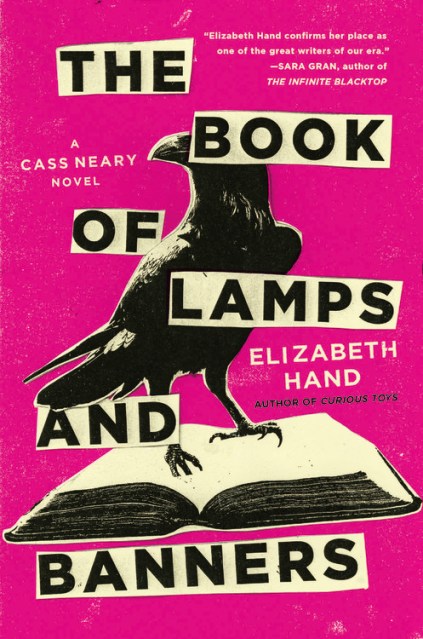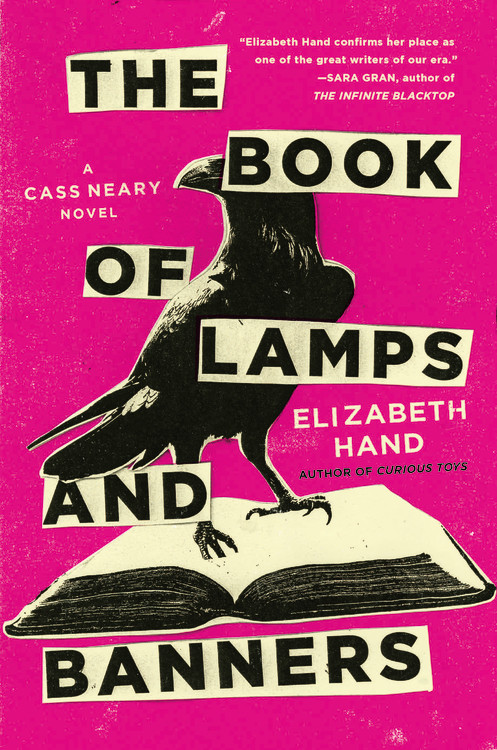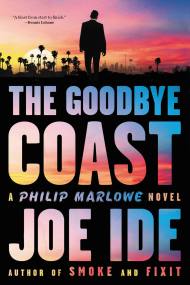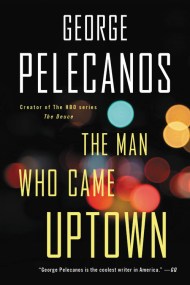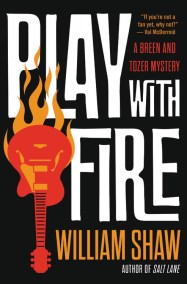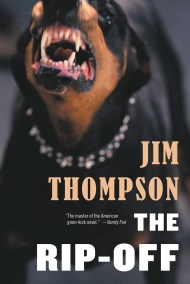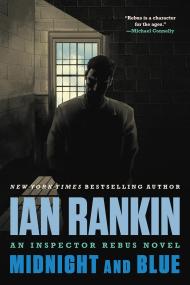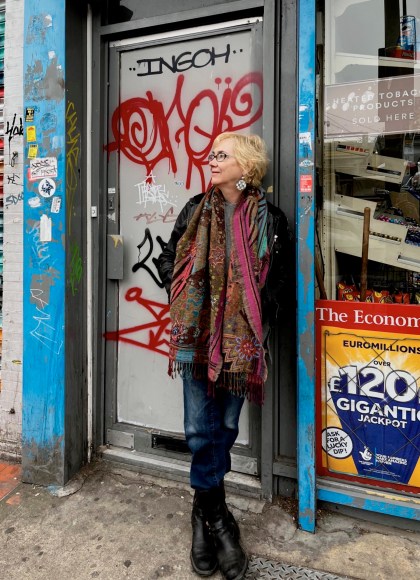By clicking “Accept,” you agree to the use of cookies and similar technologies on your device as set forth in our Cookie Policy and our Privacy Policy. Please note that certain cookies are essential for this website to function properly and do not require user consent to be deployed.
The Book of Lamps and Banners
Contributors
Formats and Prices
- On Sale
- Sep 29, 2020
- Page Count
- 352 pages
- Publisher
- Mulholland Books
- ISBN-13
- 9780316485937
Price
$27.00Price
$34.00 CADFormat
Format:
- Hardcover $27.00 $34.00 CAD
- ebook $13.99 $17.99 CAD
- Audiobook Download (Unabridged)
This item is a preorder. Your payment method will be charged immediately, and the product is expected to ship on or around September 29, 2020. This date is subject to change due to shipping delays beyond our control.
Buy from Other Retailers:
Photographer Cass Neary is desperate to get home, and she’s already lost her camera — like losing a limb. Now her only chance is to cash in on a deal that a friend is about to cut for a legendary illuminated manuscript: The Book of Lamps and Banners. Rumored to have been rescued from the Library at Alexandria, the Book is said to contain ancient esoteric knowledge, even an otherworldly power.
So when an intruder brazenly steals the manuscript, Cass and her ex-con lover Quinn must get it back-plunging headlong into a shady underworld where antiquarian booksellers, unhinged tech entrepreneurs, and brutal nationalists all converge. This breathless psychological thriller, featuring one of the greatest amateur sleuths of the past decade, could only come from the mind of Elizabeth Hand.
So when an intruder brazenly steals the manuscript, Cass and her ex-con lover Quinn must get it back-plunging headlong into a shady underworld where antiquarian booksellers, unhinged tech entrepreneurs, and brutal nationalists all converge. This breathless psychological thriller, featuring one of the greatest amateur sleuths of the past decade, could only come from the mind of Elizabeth Hand.
“Kaleidoscopic, dark, and mysterious . . . This novel is a jaw-punch, written with a snarling grace.” — Paul Tremblay, author of The Cabin at the End of the World
“I love Cass Neary . . . . Her latest misadventure is vivid and haunting, braiding the ancient and occult with the unholy frights of the modern world.” ―Steph Cha, author of Your House Will Pay
“Elizabeth Hand has delivered a startling book that is dirty, wise, aching, and almost magical.”―Ivy Pochoda, author of These Women
“I love Cass Neary . . . . Her latest misadventure is vivid and haunting, braiding the ancient and occult with the unholy frights of the modern world.” ―Steph Cha, author of Your House Will Pay
“Elizabeth Hand has delivered a startling book that is dirty, wise, aching, and almost magical.”―Ivy Pochoda, author of These Women
Series:
-
“I love Cass Neary, the smart, messy, substance-abusing, death-marked ghost of punk. Her latest misadventure is vivid and haunting, braiding the ancient and occult with the unholy frights of the modern world. A thrill ride crackling with sulfurous brilliance.”Steph Cha, author of Your House Will Pay
-
“Cass Neary is a remarkable heroine. As with Sherlock Holmes, her power lies in the act of seeing what ordinary people cannot, only where Holmes brings clues to light, Neary is content to linger in the dark. Her eye catches the liminal spaces between clarity and shadow so well I found myself rereading passages for the beauty of her way of seeing.”New York Times Book Review
-
"The ancient manuscript at the center of The Book of Lamps and Banners is as kaleidoscopic, dark, and mysterious as Hand's amateur sleuth. This novel is a jaw-punch, written with a snarling grace. Cass Neary--the aging punk photographer living within darkest edges of our broken civilization-is my hero. And so is Liz Hand."Paul Tremblay, author of A Head Full of Ghosts and The Cabin atthe End of the World
-
"It's hard to imagine a more perfect novel than The Book of Lamps and Banners. In her fourth Cass Neary outing, Elizabeth Hand has delivered a startling book that is dirty, wise, aching, and almost magical. Hand expertly marries muscular prose to sophisticated detail, resulting in an enviably smart, fearless novel that conjures demons, evokes an immediate sense of place, and summons the surreal."Ivy Pochoda, author of These Women
-
"A wild ride that defies comparison: pill-popping idealist Cass Neary’s obsessive hunt piles on teeth-grinding, story-propelling tension, and Hand’s gifted portrayal of subcultures seamlesslyBooklist (starred review)
links Cass’ past in New York’s ’80s punk scene, London’s rare-book dealers, and Odinist neo-Nazis." -
"What a story! Powered by pure adrenaline and excitement, engrossing and yet human to the core—Elizabeth Hand has written a barn burner of a thriller. What a delight."Rene Denfeld, author of The Child Finder
-
“A hair-raising, mind-bending trip… Exquisitely suspenseful, and the paranoia suffusing the story is very much of our present moment. The idea that any single source can make sense of everything happening around us is as alluring as it is dangerous [and] half of the mystery in The Book of Lamps and Banners is wondering whether Cass Neary will save us or take us down with her.”BookPage (starred review)
-
“Cass Neary is a tough, self-destructive character who still exudes compassion, courage, and love for the beauty and the pain of life—even more so because she recognizes its impermanence. Part The Club Dumas, part The Girl With the Dragon Tattoo, all punk attitude and beautiful ache.”Kirkus Reviews (starred review)
-
“A propulsive exploration of obsession and addiction.”Sarah Weinman, The Crime Lady
-
“If The Book of Lamps and Banners had a playlist, it would feature Patti Smith and the Ramones…The high-speed narrative, jittery and swift, mirrors Cass's addiction. . . . Fans of Scandinavian crime fiction will enjoy this excellent series offering an intelligent puzzle along with gritty reality.”Shelf Awareness
-
"Picture The Maltese Falcon, but instead of a black bird, there's an ancient and mystic manuscript, and instead of a private eye with a code, there's an aging punk photographer amped up on booze and speed. Elizabeth Hand's genre mash-up is a dizzying ride."Peter Swanson, author of Eight Perfect Murders
-
“Intense and hard to put down... Elizabeth Hand’s writing is crisp and vividly imagined.”Mystery Scene
-
"If Dan Brown wrote TheGirl With the Dragon Tattoo, you'd have something like Elizabeth Hand'sThe Book of Lamps and Banners. A tight, gritty page-turner that gnaws at your fingertips and gets under your skin -- the best kind of addiction."Peter Clines, New York Times bestselling author of Paradox Bound
-
“Brilliantly entertaining and surprisingly heart-wrenching . . . Pure triumph, from end to end."Gemma Files, author of Experimental Film
-
“Enjoyable . . . The action hurtles toward an exciting climax on an island off the Swedish coast. That this adventure ends for once on a positive note for Cass, who so far has been living on an addict’s ragged edge, will please series fans. Newcomers will find this a good entry point.”Publishers Weekly
-
"With each new book, Elizabeth Hand's great creation Cass Neary grows more complex, and fascinating. She's tough, smart, f*cked up. And I love her. If you've been following her since Generation Loss, you already know all this. If you haven't, read this book."Ellen Datlow, winner of the HorrorWriters' Association and World Fantasy Life Achievement Awards
-
PRAISE FOR THE CASS NEARY SERIESMegan Abbott, author of Dare Me
"Nerve-jangling and addictive.... With Cass--relentless in her dangerous curiosity, her ruthless art of survival--Hand has created an anti-hero for the ages. We'd follow her anywhere, into any glittery abyss, and do." -
"I love Elizabeth Hand's Cass Neary novels -- they're tough-minded, beautifully written, and unique. One of the best series out there."Jeff VanderMeer, author of Dead Astronauts
-
"Fiercely frightening yet hauntingly beautiful, with a startling heroine you'll never forget.... I've long been a fan of Elizabeth Hand's amazing books, and once again she proves why she is truly a writer's writer, her prose so glowing it makes all the rest of us jealous."Tess Gerritsen, author of the Rizzoli & Isles series
-
"Elizabeth Hand's Cass Neary novels, rightly praised for their icy tension and remarkable darkness, are threaded, like the best of punk in any medium, on a bloodied yet admirably stubborn humanism."William Gibson, author of Neuromancer
-
"Intense and atmospheric.... An inventive brew of postpunk attitude and dark mystery. Elizabeth Hand writes with craftsmanship and passion."George Pelecanos, author of The Man Who Came Uptown
Newsletter Signup
By clicking ‘Sign Up,’ I acknowledge that I have read and agree to Hachette Book Group’s Privacy Policy and Terms of Use
